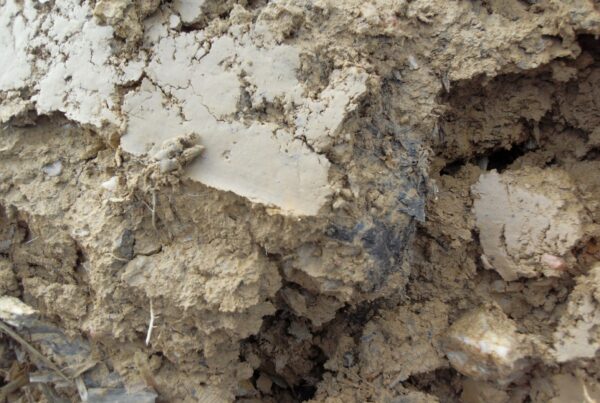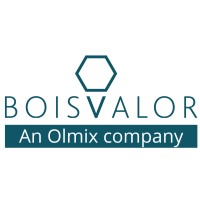On the second day of the Breizh Algae Tour 2018, Olmix Group headed to the Gollwitzer Agrar farm in Brandenburg an der Havel, Germany, to discuss some of the hottest topics concerning the Plant Care industry.
The need to highlight the great complexity of current plant production challenges and the urgency to adapt to a new context where the world population is growing fast and facing climate change led Olmix Group to organize a Plant Care Field Trip on the second day of the Breizh Algae Tour 2018.
Held at the Gollwitzer Agrar farm in Brandenburg an der Havel, Germany, the event brought together more than one hundred professional experts from the industry who had the opportunity to exchange knowledge and experience on issues such as soil fertility, stimulating crop production and circular economy.
“The world has to produce more and better with less. We have to find some new ways of production and algae is one of the alternatives to meet this challenge. Olmix Group has a global vision where it is vital to reduce pesticides and chemical fertilizers in agriculture. In fact, a whole range of products is being developed for farmers to improve soil quality, nutrition quality and crops resistance to stress. Our aim is to have an all-round product range based on algae to support agroecology”, Mr Jean-Marie Bocher, Olmix Group’s International Director, said during his opening speech.
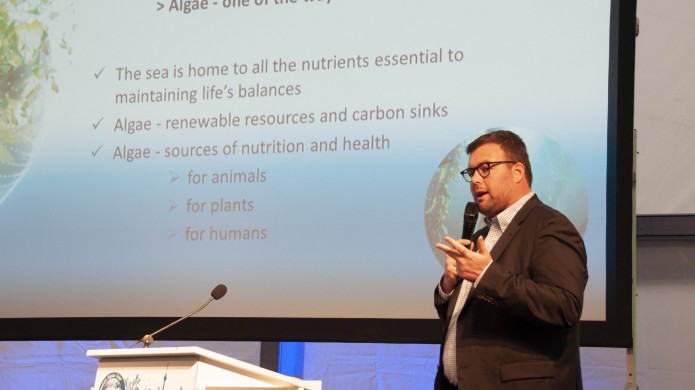
Mr Jean-Marie Bocher (Olmix Group).
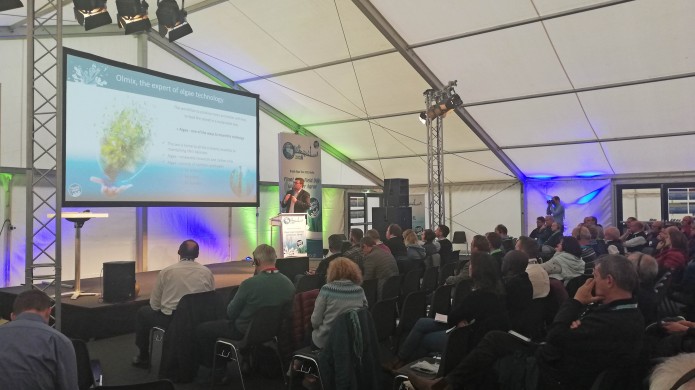
Mr Jean-Marie Bocher (Olmix Group).
Indeed, the transition of farms towards a new way of production is one of the big challenges that producers are to face nowadays. For them, the answer is clear: actors should learn to use the inputs in the best way and find new natural and respectful solutions such as biopesticides.
“Farmers have to observe, choose the best tools and then change the strategy of their production model. We have to move towards a low carbon agriculture! Agroecology is the carbon agronomy where the soil is the basement of the new way to produce with less. Soil life activity is the key and we have to find resources to help us improve that activity”, Mr Sébastien Roumegous, from the Development Center for Agroecology (France), explained.
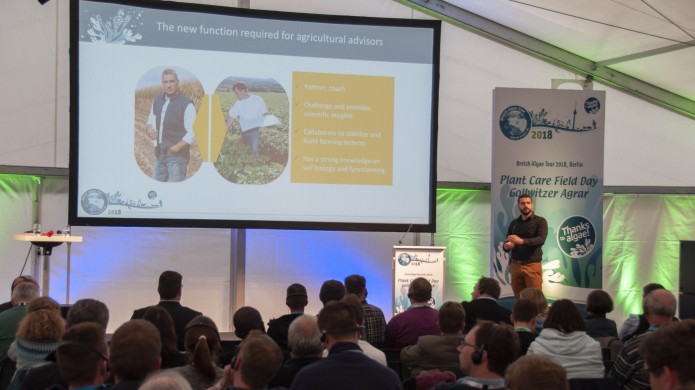
Mr Sébastien Roumegous (Development Center for Agroecology, France).
Improving agricultural practices Thanks to Algae!
The afternoon workshops of the Plant Care Field Trip focused on the potential of seaweeds based biosolutions to help the transition towards a more sustainable way to produce by following specific plans of action on crops, fodders, water quality and soils.
First, it was Mr Carsten Bammann, Product Manager of Olmix Group, who precisely described the current concern among several European countries by the bad quality of water, which is partly related to the excessive use of fertilizers and chemicals in agriculture:
“The water quality is a priority topic for the environment and for human health. There is a growing concern by an excess of nitrates in the water. This excess of nitrates comes from the use of high quantities of fertilizers and manures, but also from a dysfunction of soil life. Once again, everything starts from the soil life: anaerobic conditions in soil lead to putrefaction of organic matter and gas emission such as CO2, ammoniac and methane!“.
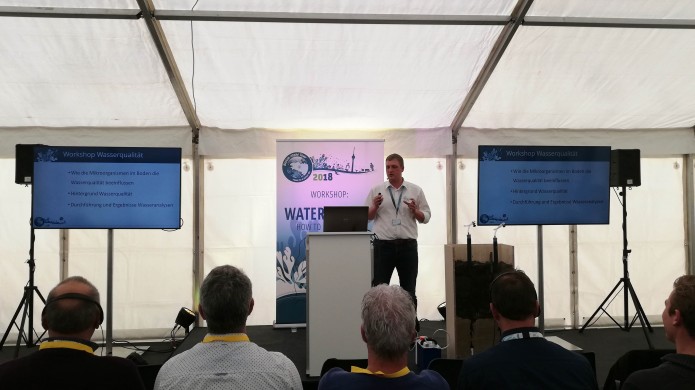
Mr Carsten Bammann (Olmix Group).
Therefore, there is clear evidence that the soil is the basement of production but… how can we make a good diagnosis to improve its fertility? And how can we stimulate soil life?
“The only way to create porosity in the deepest part of the soil is to stimulate soil life and roots development. No machine can interfere in this part… The activity of earthworms is able also to create porosity by going up to catch the organic matter on the top of the soil and by going down to digest it! If you export too much organic matter of the fields you don’t let enough food for earthworms and so you reduce their capacity to mix the soil and to create galleries. The best challenge for the next generation is not to use more fertilizers but to maximize the use of what we have under our feet: the soil and its biological activity“, Mr Benoit Le Rumeur, from Olmix Plant Care, explained.
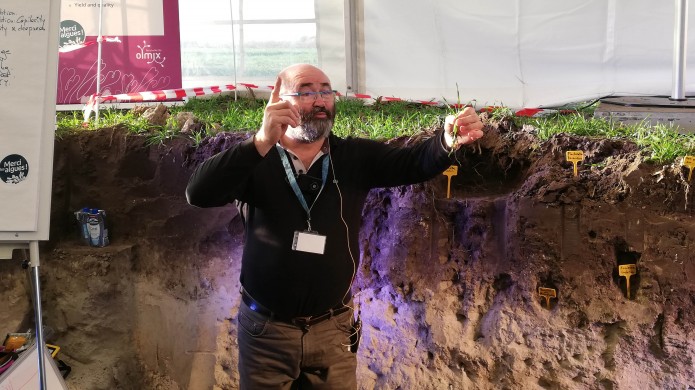
Mr Benoit Le Rumeur (Olmix Group).
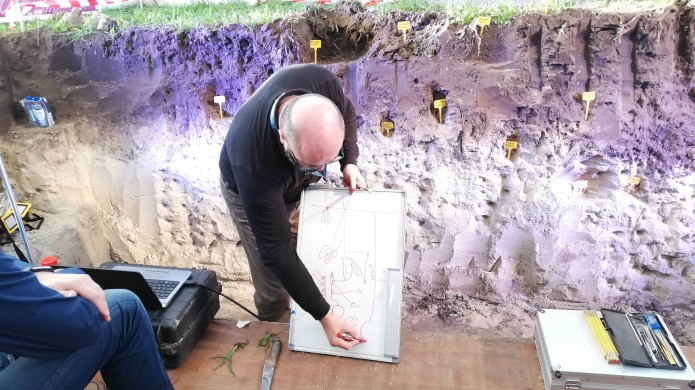
Mr Benoit Le Rumeur (Olmix Group).
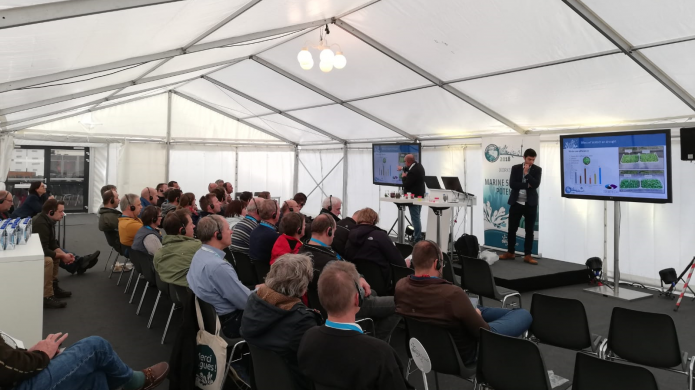
Florian Tilly and Emmanuel Bausson (Olmix Group).
In fact, Olmix Plant Care has highly invested in research to produce with less chemicals and to bet on efficient biosolutions such as biostimulants and biopesticides that improve the natural defenses of plants while increasing the profitability of crops. Specific algae extracts have revealed their powerful potential!
“Due to the specific environment in which algae grow, they develop unique properties to resist to stress. Olmix’s molecules extracts from seaweeds can boost the resistance that crops face to abiotic stress (heat, frost…). Already producer of algae-based biostimulants, Olmix Group works currently to develop algae based biopesticides:
- Biostimulants to improve the nutrients uptake by the plants and the resistance to abiotic stress.
- Biopesticide to help the plants to resist to diseases and to reduce the use of chemical pesticides.
Recent trials with technical partners such as Sciences Agro Atlantique or Vegenov illustrate the efficacy of the algae-based biosolutions on yield and on the profitability of the crops“, Mr Florian Tilly and Mr Emmanuel Bausson, from Olmix Plant Care, discussed at the session.
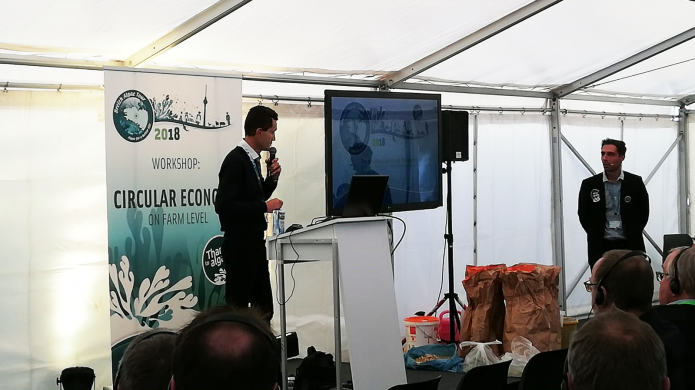
Jérôme Alix and Franck Bienne (Olmix Group).
Last, but not least, ‘circular economy’ was brought up on stage once again by Mr Jérôme Alix and Franck Bienne, from Olmix Plant Care, who shone a spotlight on the value the organic matters for the benefit of crops and fodders:
“The use of mineral fertilizers and manures is often linked to carbon and nitrogen emissions. Loss of nutrients and carbon are a loss of value and cause damages on the environment. Today the global model is a leaking system. It’s necessary to maximize the recycling of elements: carbon to feed the soil life and nutrients to feed plants. Each component of the soil biodiversity is essential to transform crops residues or manures… if a component is missing, the good transformation of organic matter will not be achieved! Thanks to algae, Olmix provides solutions to improve the quality of the soil and to optimize the organic matter transformation“, they concluded.
After the workshop session, Mr Hervé Balusson, Olmix Group’s CEO & Founder, thanked all speakers and participants of the Plant Care Field Trip for bringing up such a high-quality event and closed the day on stage with Mr Stefan Schulze-Bergcamen, owner of the farm where the event took place.

